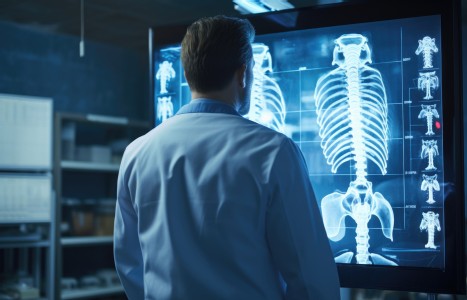Many relevant diagnostic signs are not performed deliberately by the examiner or by the patient at the examiner’s direction. They are observed as the patient reacts to their condition. Fortin’s finger sign, Minor’s sign, and Vanzetti’s sign are three examples of this principle.
News in Brief
Gert Bronfort, DC, PhD, vice president of research at Northwestern Health Sciences University, is the 2012 recipient of the Lincoln College Education & Research Fund (LCERF) Prize, joining 2011 recipient Dr. Scott Haldeman. The prize, awarded to Dr. Bronfort by Dr. John Mayer, Lincoln College Endowed Chair in Chiropractic and Biomechanical Research at the University of South Florida, at the Florida Chiropractic Association's national convention in August, recognizes research excellence in chiropractic care over the past three years (2009-11).
The Lincoln College Education & Research Fund, the FCA and the Florida Foundation fund and support the Lincoln Prize. The LCERF encourages charitable donations in support of its ongoing efforts to fund chiropractic education and research nationwide.
New Mexico Scope Battle: ACA Files Brief in Support of State Self-Determination
The American Chiropractic Association has filed an amicus brief with the New Mexico Court of Appeals in support of doctors of chiropractic in the state who want to create an advanced-practice certification program for chiropractic physicians. According to an ACA press release, the association filed the brief with the court after the International Chiropractors Association "joined forces" with the New Mexico Medical Board and the New Mexico Board of Pharmacy late last year, requesting that the state chiropractic board halt the advanced-practice efforts.
"It is ACA's opinion that the New Mexico Board of Chiropractic Examiners should be given the same respect as other state boards and allowed to determine what is best for chiropractic physicians and patients in that state. We object in particular to actions by the ICA, as well as the state's pharmacy and medical boards, to interfere with the will of chiropractic physicians in New Mexico and the needs of their patients," said ACA President Keith Overland, DC.
New York Times Prints ACA President's Letter to Editor
In other news involving the American Chiropractic Association, The New York Times recently ran a letter to the editor penned by ACA President Dr. Keith Overland. The letter, written in response to a Times article titled "Too Young to Have a Stroke? Think Again" (Sept. 4 issue), stated the following:
"The best available evidence shows no established cause-and-effect relationship between spinal manipulation and cervical artery dissection leading to stroke. The article unnecessarily raises concerns about a treatment that is both safe and effective for relieving neck pain and headaches.
"The most comprehensive research on this subject, published in the medical journal Spine, concludes that the risk of vertebrobasilar artery stroke associated with a visit to a chiropractic physician is no different from the risk of stroke following a visit to a primary care physician. The researchers determined any observed association between stroke and cervical manipulation or primary care visits is most likely linked to patients with undiagnosed vertebral artery dissections seeking care for neck pain or headaches prior to their strokes."
Dr. Overland's letter to the editor, which appeared in the Sept. 11 issue (Science Times section), was prompted by this statement in the Times article: "[A]ctivities that can cause a carotid tear are those that involve sudden neck jerks, including scuba diving, golf and tennis, as well as chiropractic manipulation and bending the head sharply back." [Our emphasis added]
TCC Continues 9/11 Program Honoring First Responders
Texas Chiropractic College is continuing its 9/11 Harris County First Responders Program, which provides chiropractic care at minimal or no cost to active-duty firefighters, fire inspectors, police officers, officers in the Sheriff's Department, constables, Texas rangers, Department of Public Safety officers and paramedics. The TCC 9/11 Program launched last year on the 10-year anniversary of the 9/11 terrorist attacks and was initially designed to run for one year only.
"After working with area first responders the past year, it was a very easy decision to extend the program," said Dr. Barry Wiese, TCC Dean of Clinics. "It has been an honor for our faculty and students to provide care for these men and women, and to help them be at their best so they can help others."
In addition to serving local first responders, the TCC Moody Health Center also provides care free of charge to active-duty military personnel, their spouses and children.


